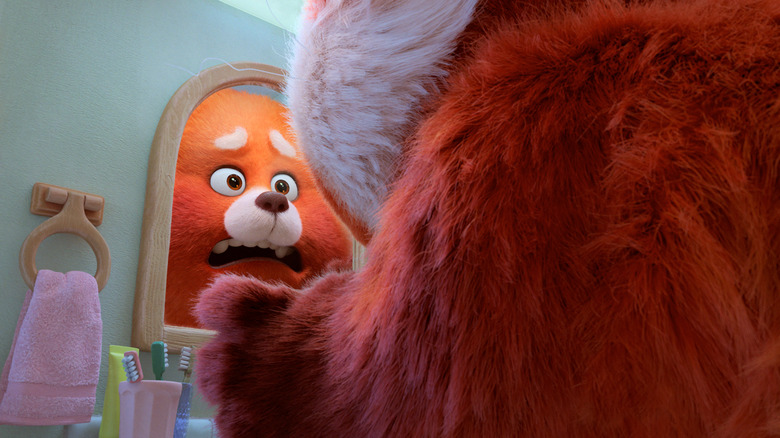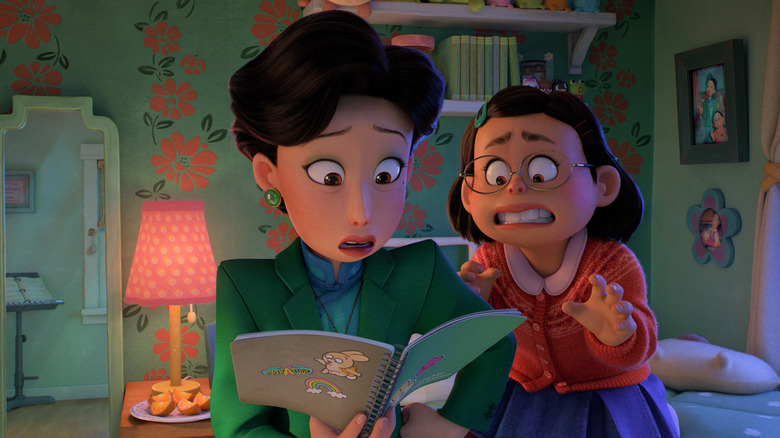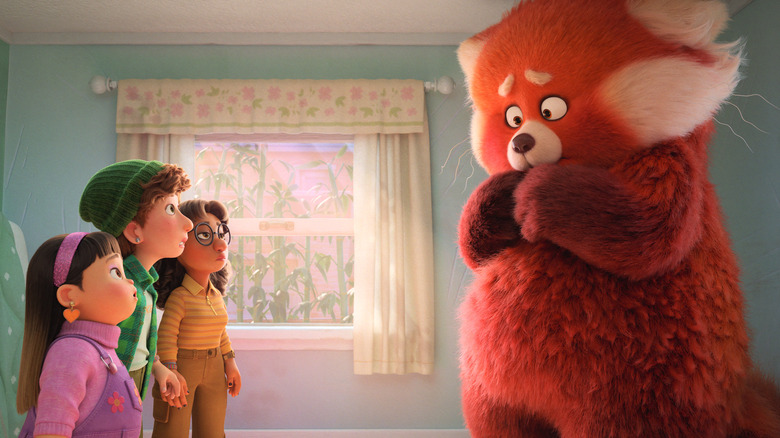Turning Red Review: Growing Pains Were Never So Delightful
Like every millennial girl who came of age at the turn of the 21st century, I owned the Backstreet Boys' seminal hit album, "Millennium." But like all things that preteen girls cherished, my album — once scratched by overuse — soon gathered dust as it lay forgotten alongside all the other mementos of middle school. But when I was 21 years old, my cousin invited me to a Backstreet Boys reunion concert and I casually accepted. It would be a fun trip down memory lane, I thought, a way to while away a lazy summer afternoon. But something happened when the boys (now 40-something men) stepped onto that glittering stage. I was seized by some indescribable emotion that rolled through my entire body — it was something like ecstasy, a little like taking a full shot of adrenaline straight to the chest. My cousin and I looked at each other. We screamed. And the rest of the concert I could only remember as akin to being on a two-hour roller coaster. Few movies better understand that feeling of feeling so much than Pixar's "Turning Red."
Directed by Domee Shi (who won an Oscar with her first directorial effort, the lovely Pixar short "Bao"), "Turning Red" is a coming-of-age fantasy comedy that makes the coming-of-age part literal. It follows the uber-confident Meilin "Mei" Lee (breakout star Rosalie Chiang), a Chinese-Canadian 13-year-old who does what she wants and says what she wants — except in the presence of her parents. Mei was raised in that classic Asian immigrant second-generation way: to revere and respect her parents' wishes, while living a double life to hide her own burgeoning identity and urges. But Mei is happy with her life — she loves her parents, and loves the temple they run with their red panda mascot (for which she happily dons the costume of when tour groups come visit). And she also loves fangirling over the dreamy boy band 4*Town with her friends — the supportive Miriam (Ava Morse), the deadpan Priya ("Never Have I Ever" star Maitreyi Ramakrishnan), and excitable Abby (Hyein Park) — the one guilty pleasure she keeps secret from her mom (an incredible Sandra Oh). But Mei's perfect, if precarious, life is about to get a sledgehammer taken to it by that great beast: puberty.
Getting anime-ted
For Mei, puberty manifests itself in a much wilder way than some acne and an accidental bloodstain on the pants (both of which are mortifying enough). When Mei develops a crush on the teen drugstore clerk, her doodles of him are discovered by her mother, who humiliates her by storming into the drugstore and berating the very confused clerk for all of Mei's classmates to see. That night, Mei replays the humiliation over and over in her mind, and something activates: she dreams of the red panda god at the altar of her parents' temple, and its eyes glow. When she wakes up the next morning, she is horrified to discover that she has transformed into a giant red panda.
"Turning Red" wears its anime influences on its sleeve and its middle-school shame on its face. Its animal transformation conceit is clearly pulled from anime classics like Rumiko Takahashi's martial arts comedy "Ranma 1/2" or Isao Takahata's "Pom Poko," while the elastic animation style pays direct homage to anime — Mei's eyes will suddenly transform into those big, watery anime eyes, or the characters will morph into that flattened 2D anime style, anime flames and lighting bolts will shoot across the frame, while the bright, hyper-saturated colors make everything look and feel bigger — as if the emotions of a preteen girl can't be contained by the limitations of reality. Sometimes it's a lot, the loud colors, loud characters, and fast pace can overwhelm and feel like a Disney Channel show crossed with an anime opening video. But it makes "Turning Red" one of the visually stimulating animated films to come out of Pixar in a long while, and an intriguing glimpse at how the future of CG animation will come with borrowing from the best that 2D animation can offer (as we saw with the similarly anime-inspired "Luca" last year).
Surfing the crimson wave
But while painfully relatable moments and cringe comedy are the orders of the day in "Turning Red," it's the movie's unapologetic depiction of female desire that is borderline revolutionary. Rarely do we see an animated family film get so messy and honest and raw when it comes to those confusing middle-school crushes, or those boy band daydreams, or those hallway humiliations. Shi, co-writer Julia Cho, and their creative team turned to their own middle-school experiences to give "Turning Red" that uniquely relatable texture, and that — combined with the film's heightened visual style — turns the film into a borderline visceral experience, one that will incite a flight-or-fight response that has you reliving all that pubescent awkwardness all over again.
Mei doesn't know what to do with all those feelings, and her strong emotions are what activate her red panda transformation — which her friends soon discover. But their unconditional support surprises her, and she finds herself better able to control her transformation whenever her friends are around. Amid all the boy bands, the parental pressure, and the red panda of it all, Mei discovers that her great love is her friends. It's another lovely texture to this surprisingly complex film — a movie that deals with pubescent urges, female desire, periods (there's a reason the red panda is so red) — and part of what makes "Turning Red" stand out amongst its coming-of-age peers. Shi deftly navigates all these deeper themes, bringing it back home to the theme that made her short film "Bao" such a breakout hit: generational immigrant angst. Mei has to figure out who she is outside of her mother's strict expectations, outside of her family's ancestral line, and even outside of her friends. And if a boyband is what helps her figure it out, so be it.
"Turning Red" is another Pixar homerun, a low-stakes adventure turned high-stakes thanks to its heightened emotions and envelope-pushing animation style. It's loud and unapologetic, and while that frenzy of stuff can sometimes turn frantic, it's one of the most accurate cinematic depictions of what it was like to be a hormonal teenage girl — city-destroying kaiju fights, and all.
/Film Rating: 8 out of 10


